
Internal Family Systems (IFS) Therapy: A Deep Dive into Healing Your Inner World
Internal Family Systems (IFS) therapy is an innovative approach to mental health that views the mind as made up of different parts, each with its own role and emotions. Whether you're dealing with trauma, anxiety, or self-doubt, IFS helps you identify and heal these parts, allowing your true, compassionate Self to emerge. In this post, we explore how IFS works, the types of parts it addresses, and how this transformative therapy can lead to lasting emotional well-being. Learn how IFS can help you develop self-compassion, reduce inner conflict, and foster personal healing.

Understanding Grief: The "Ball in a Box" Analogy and Its Impact on Mental Health
Grief is an inevitable part of life, but understanding it can make the healing process more manageable. The "Ball in a Box" analogy provides a simple yet powerful explanation of how grief evolves over time. In this blog, we dive deep into the emotional and mental health impacts of grief, offering actionable coping strategies to help you navigate loss. Whether you're seeking personal healing or supporting a loved one through grief, this guide will provide the insights and tools you need to move forward with compassion and resilience.

Embracing Unconditional Positive Regard: The Heart of Therapeutic Rapport
On the Pathways to Wellness blog, Francesca Wehr, LCSW, discusses the transformative power of unconditional positive regard in therapy. Discover how this judgment-free approach builds trust, encourages self-acceptance, and strengthens the therapeutic relationship.

Understanding the Different Types of Therapy: A Comprehensive Guide to Finding the Right Approach
Navigating the world of therapy can be overwhelming, but understanding different therapeutic approaches is crucial for finding the best fit for your needs. From Cognitive Behavioral Therapy (CBT) to Dialectical Behavior Therapy (DBT) and psychodynamic therapy, this comprehensive guide breaks down popular modalities to help you make an informed decision on your mental health journey. Discover the unique benefits of each therapy type and learn how to choose the right path for your personal growth and healing.

Before You Speak, T.H.I.N.K.: The Power of Mindful Communication
The world of instant messaging and real-time conversations has undoubtedly made communication more accessible than ever. However, it has also made it all the more critical for us to pause and reflect on the words we use. The acronym T.H.I.N.K provides a simple yet potent framework for fostering mindful communication. It stands for Truth, Helpfulness, Inspiration, Necessity, and Kindness. This article delves into each component of the T.H.I.N.K method, illustrating how it can enhance interpersonal relationships and self-esteem.

Navigating Your Inner Landscape: Understanding and Enhancing Self-Esteem
In the latest edition of "Pathways to Wellness," Francesca Wehr, LCSW, offers a profound look into the dual pillars of self-esteem and self-worth, revealing how these crucial elements of psychological health shape our perceptions and interactions. This insightful exploration highlights the fluid nature of self-esteem, influenced by our successes and the way we perceive others' views of us, and contrasts it with the enduring nature of self-worth—a deep-seated belief in our intrinsic value. Whether you're looking to build resilience, enhance personal development, or foster a healthier, more balanced self-image, Francesca's expert guidance provides the tools and understanding needed to cultivate a stronger sense of self in an ever-changing world. Join us to uncover the techniques and strategies essential for nurturing your self-esteem and self-worth on your path to wellness.
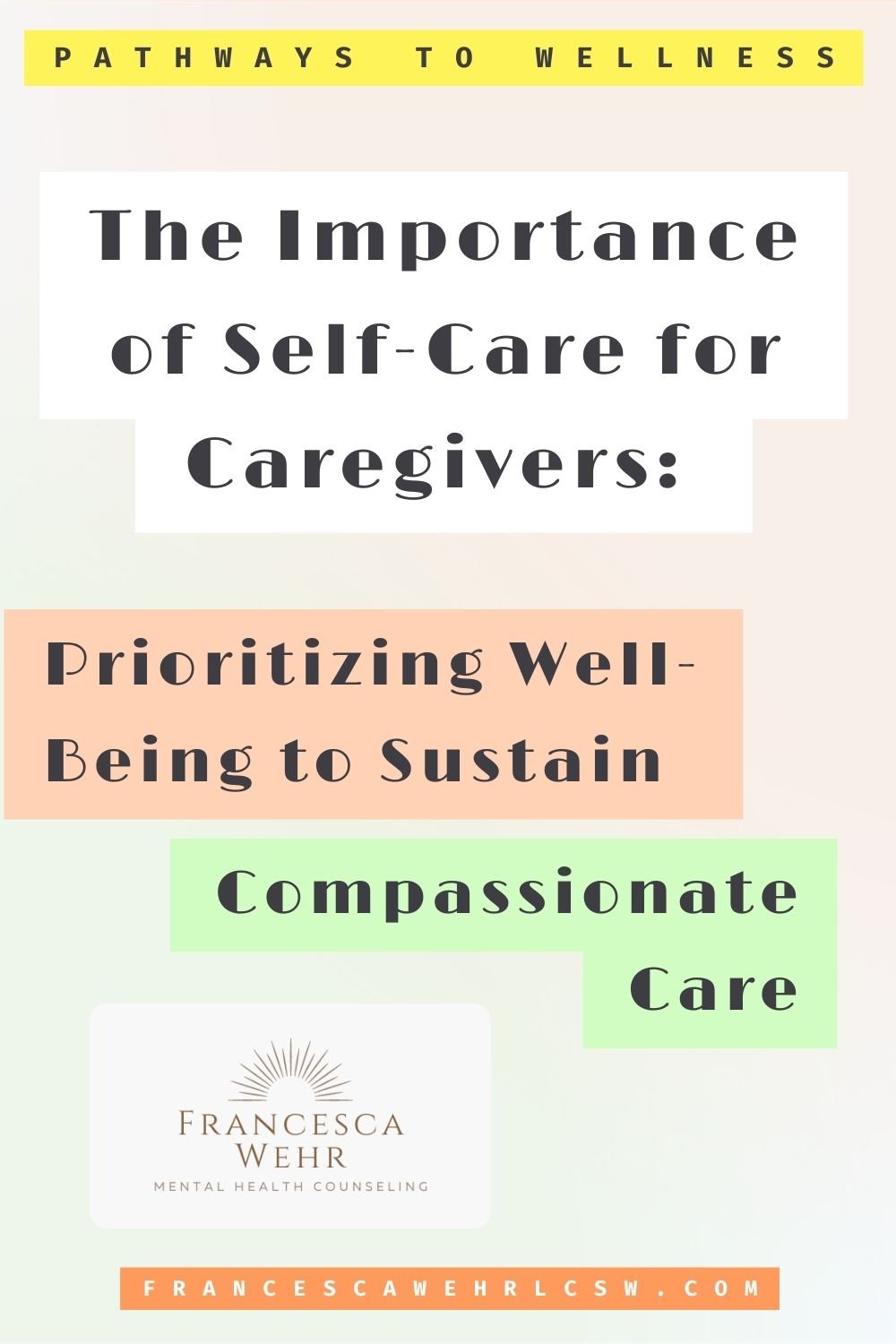
The Importance of Self-Care for Caregivers: Prioritizing Well-Being to Sustain Compassionate Care
Caregivers, whether professional or personal, play a vital role in supporting the well-being of others. However, the demanding nature of caregiving can take a toll on one's physical, emotional, and mental health. Self-care is essential for caregivers to maintain their own well-being and continue providing compassionate care for others. Pathways to Wellness: Insights from Francesca Wehr, LCSW Mental Health Counseling discusses the importance of self-care for caregivers and provides practical tips to incorporate self-care into daily routines.

Delving Deeper into Body Dysmorphic Disorder & Checking Behaviors
Body Dysmorphic Disorder (BDD), often referred to as body dysmorphia, is not just a case of low self-esteem or occasional insecurity about one's appearance. It's a profound mental health condition where individuals are consumed by an exaggerated perception of flaws in their physical appearance. A significant manifestation of BDD is compulsive "checking behavior". In this post, we'll dive deeper into understanding BDD and the intricacies of checking behaviors associated with it.

From Survival to Healing: Navigating Post-Traumatic Stress and Finding Resolution
The last part of the “From Surviving to Healing” Trauma series, this blog post navigates the complex journey from survival to healing. This requires more than just revisiting traumatic memories; it demands a reconnection to the present and a reclamation of one's sense of safety and self. For many trauma survivors, the past feels unsettlingly close, a series of vivid flashbacks and heightened states that blur the lines between then and now. The challenge is not merely to recount the trauma but to feel, deep in one's bones, that it has passed and that safety has been restored.
Healing involves a delicate balance of acknowledging the trauma while firmly rooting oneself in the present, employing strategies to calm the nervous system, and recognizing triggers without being overwhelmed by them. Techniques like mindfulness, somatic therapies, and EMDR offer pathways to process traumatic memories in a way that diminishes their power, allowing survivors to redefine their narratives on their own terms. This transformative process paves the way for a life where trauma informs but does not control, where past pain leads to present resilience, and where each survivor can truly say, "I am here, I am safe, and I am moving forward."

Getting to Know Personality Disorders: The ABCs of Clusters A, B, and C
Personality disorders represent deeply ingrained, unhealthy patterns of behavior and thinking that significantly affect how an individual perceives the world and relates to others. They're grouped into three clusters - A, B, and C - each characterized by similar or overlapping traits. Pathways to Wellness: Insights from Francesca Wehr, LCSW Mental Health Counseling explores these clusters and the disorders that fall under them.

Embracing Vulnerability: A Look at Brené Brown's Shame Resilience Theory
Shame can be an intensely painful experience, often linked to feelings of worthlessness and fear of disconnection. Psychologist and researcher Brené Brown's Shame Resilience Theory offers a lens through which we can better understand and manage shame. Pathways to Wellness: Insights from Francesca Wehr, LCSW Mental Health Counseling delves into the fundamentals of this transformative theory and how we can apply it in our lives.

From Survival to Healing: Insights into Our Brain and Body's Response
This blog post takes you on a personal journey through the landscape of trauma, focusing on the deep-seated responses our bodies and minds have to traumatic events. It sheds light on the limbic system—the emotional heart of our brain—and how it's hardwired to protect us, often leaving us with trauma that feels ever-present. We explore the idea of 'triggers,' those unexpected moments that suddenly transport us back to our traumatic experiences, and why they can be so powerful.
But this isn't just a scientific exploration; it's an invitation to see your own trauma responses in a new light. We delve into the idea that the ways we've reacted to trauma—perhaps with anxiety, avoidance, or hyper-alertness—aren't signs of weakness but are actually testament to our incredible ability to survive. Through personal reflection, the post encourages you to consider how these responses have served you, offering a compassionate perspective on your journey toward healing.
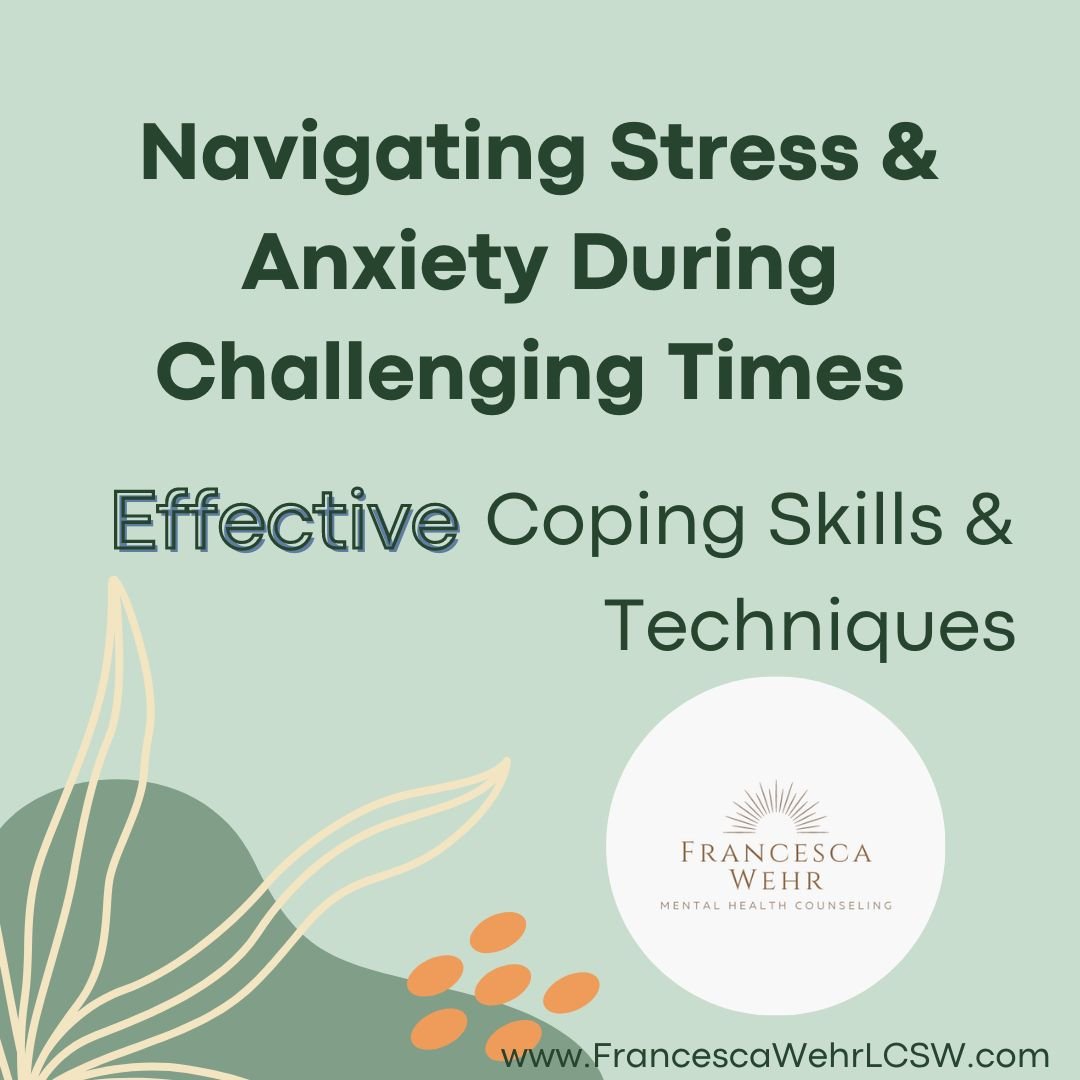
Managing Stress and Anxiety: How to Handle Stressful Situations
During challenging times, stress and anxiety can take a significant toll on our mental health. Learning effective coping skills can help you manage these emotions and maintain emotional well-being, even in the face of adversity. Pathways to Wellness: Insights from Francesca Wehr, LCSW Mental Health Counseling explores various coping skills, such as the Socratic thinking method and de-catastrophizing, to help you navigate stress and anxiety during challenging times.

Balancing Work-Life Integration for Better Mental Health: Strategies for Achieving Harmony
In today's fast-paced world, achieving a healthy work-life balance is crucial for maintaining mental and emotional well-being. A well-integrated work and personal life can reduce stress, prevent burnout, and promote overall happiness. Pathways to Wellness: Insights from Francesca Wehr, LCSW Mental Health Counseling provides practical strategies for balancing work-life integration to support better mental health.

Understanding and Overcoming Compassion Fatigue: Strategies for Sustainable Care and Emotional Well-Being
Compassion fatigue, also known as secondary traumatic stress or caregiver burnout, is a condition characterized by emotional and physical exhaustion resulting from prolonged exposure to the suffering of others. It is common among individuals in caregiving professions, such as healthcare workers, therapists, and social workers, as well as those caring for loved ones. Pathways to Wellness: Insights from Francesca Wehr, LCSW Mental Health Counseling discusses the signs and symptoms of compassion fatigue and provides practical strategies for overcoming it and maintaining emotional well-being.

What’s the Difference Between a Boundary and an Ultimatum in Relationships?
The difference between boundaries and ultimatums in relationships can often be a cause for confusion. However, understanding this distinction is essential in fostering healthy connections with others. In this blog post, we will delve into the characteristics of both and examine the core differences.
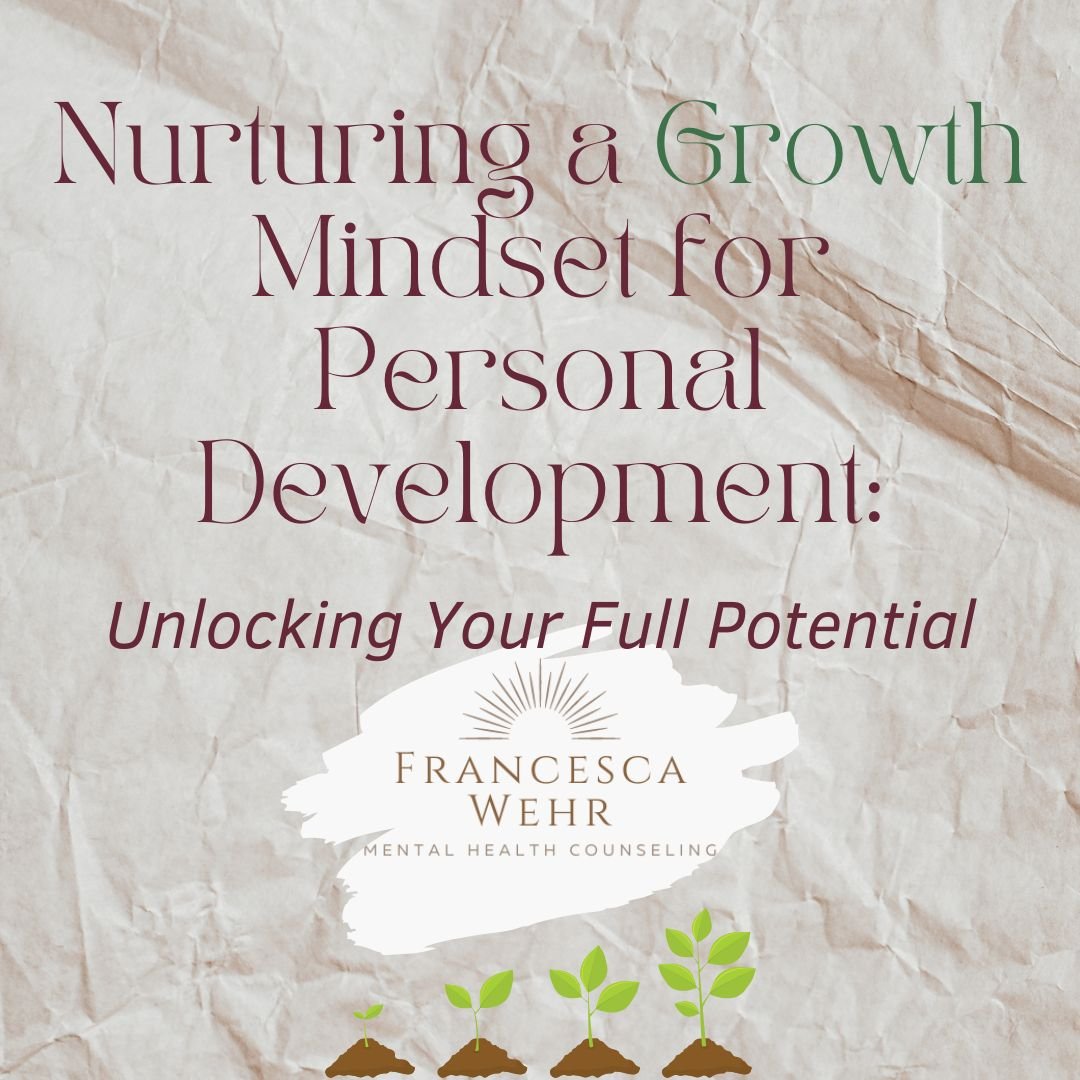
Nurturing a Growth Mindset for Personal Development: Unlocking Your Full Potential
Are you ready to unlock your full potential and embrace a life of continuous growth? A growth mindset, popularized by psychologist Carol Dweck, is the belief that our abilities and intelligence can be developed through effort, learning, and persistence. In this blog post, we dive into the transformative power of a growth mindset, offering practical tips to help you embrace challenges, replace negative self-talk, and foster personal growth. Whether you're seeking to reduce stress, improve your outlook, or enhance your personal development, these strategies will guide you on your journey to success.
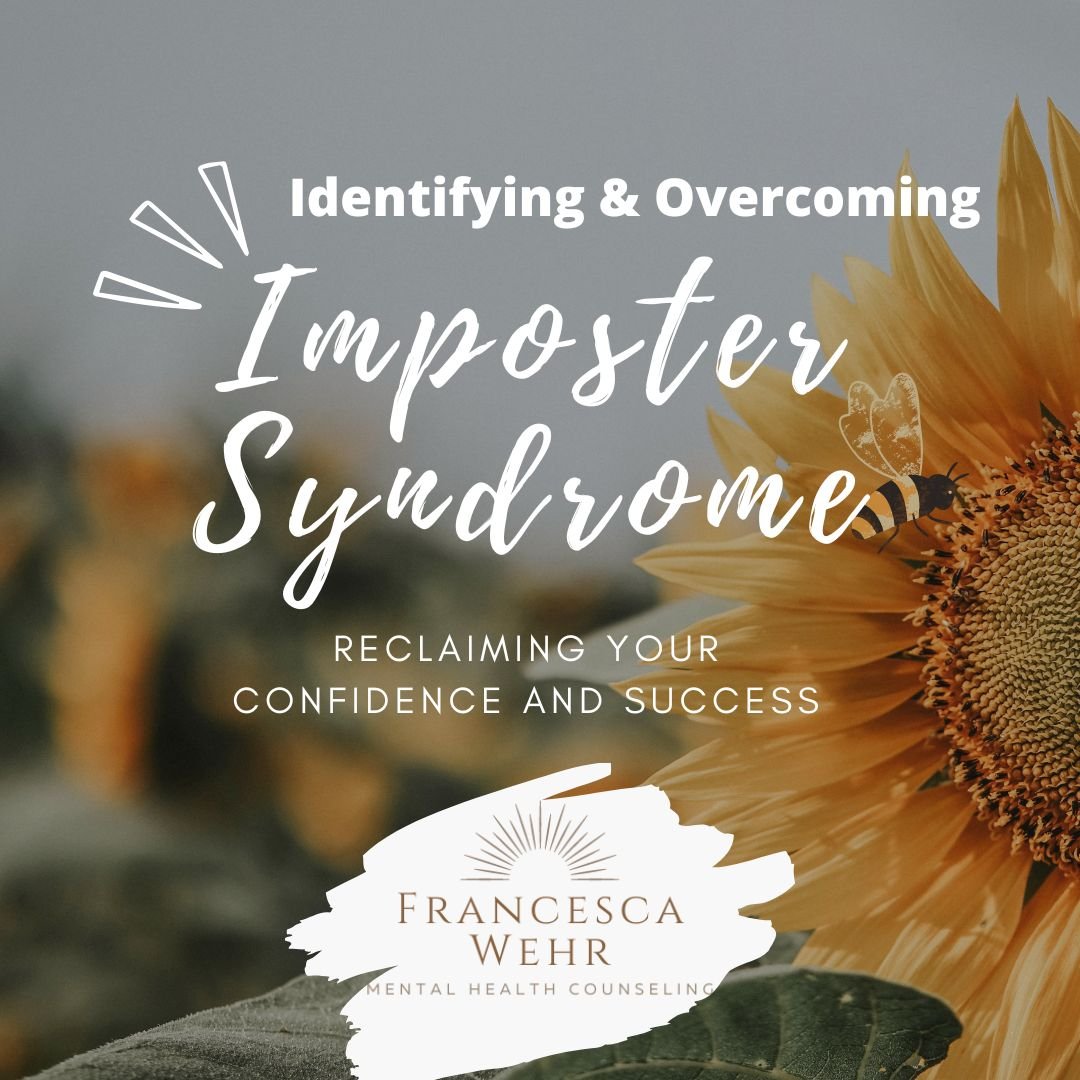
Identifying and Overcoming Imposter Syndrome: Reclaiming Your Confidence and Success
Imposter Syndrome is a psychological phenomenon where individuals doubt their accomplishments and fear being exposed as a "fraud." Despite evidence of their success, those with Imposter Syndrome struggle to internalize their achievements and often attribute them to luck or external factors. Pathways to Wellness: Insights from Francesca Wehr, LCSW Mental Health Counseling discusses how to identify Imposter Syndrome and provides practical tips for overcoming this self-limiting mindset.
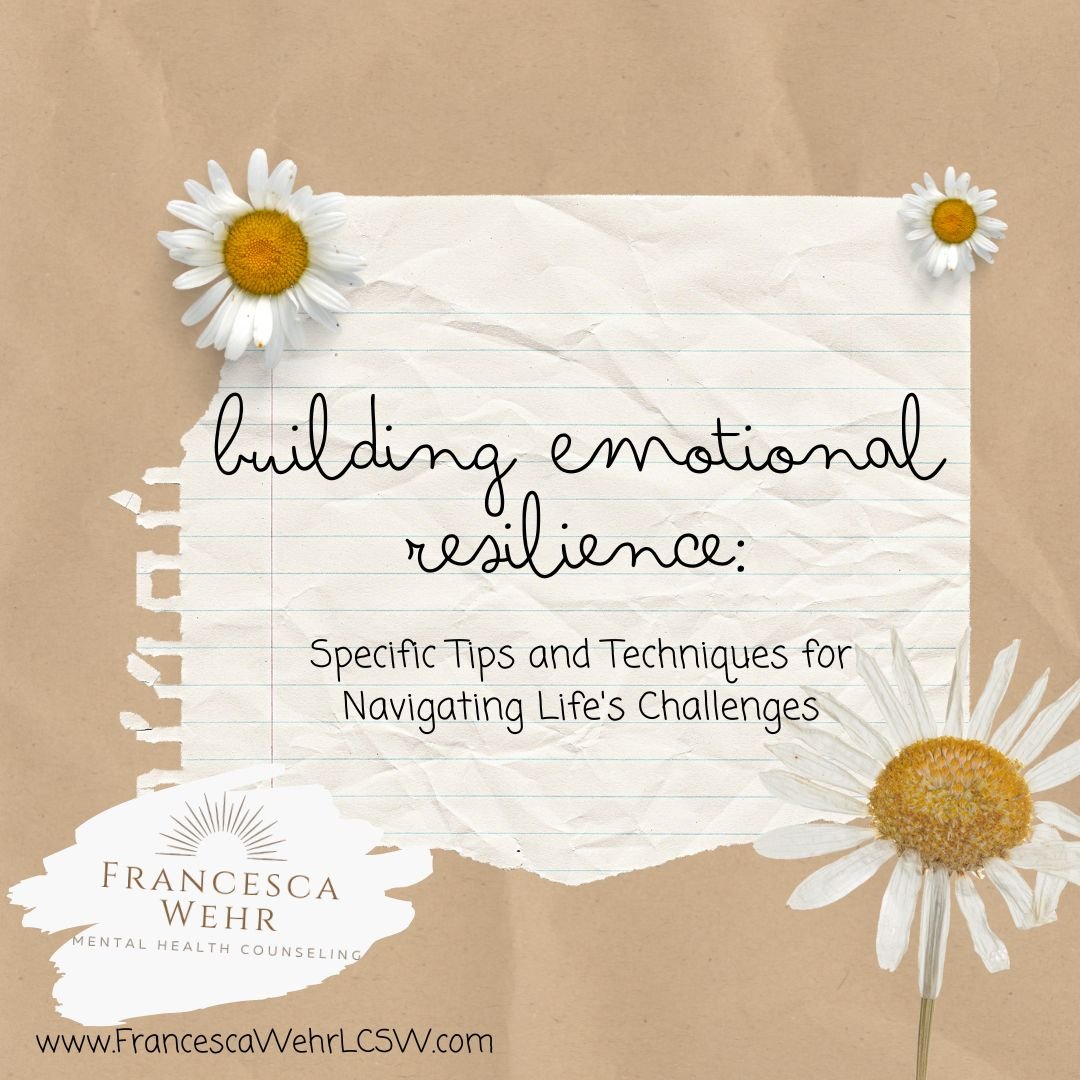
Building Emotional Resilience: Specific Tips and Techniques for Navigating Life's Challenges
Emotional resilience is essential for maintaining mental and emotional well-being in our fast-paced world. Developing this skill helps you adapt and recover from stress, adversity, or challenging situations. Pathways to Wellness: Insights from Francesca Wehr, LCSW Mental Health Counseling provides specific tips and techniques for building emotional resilience.
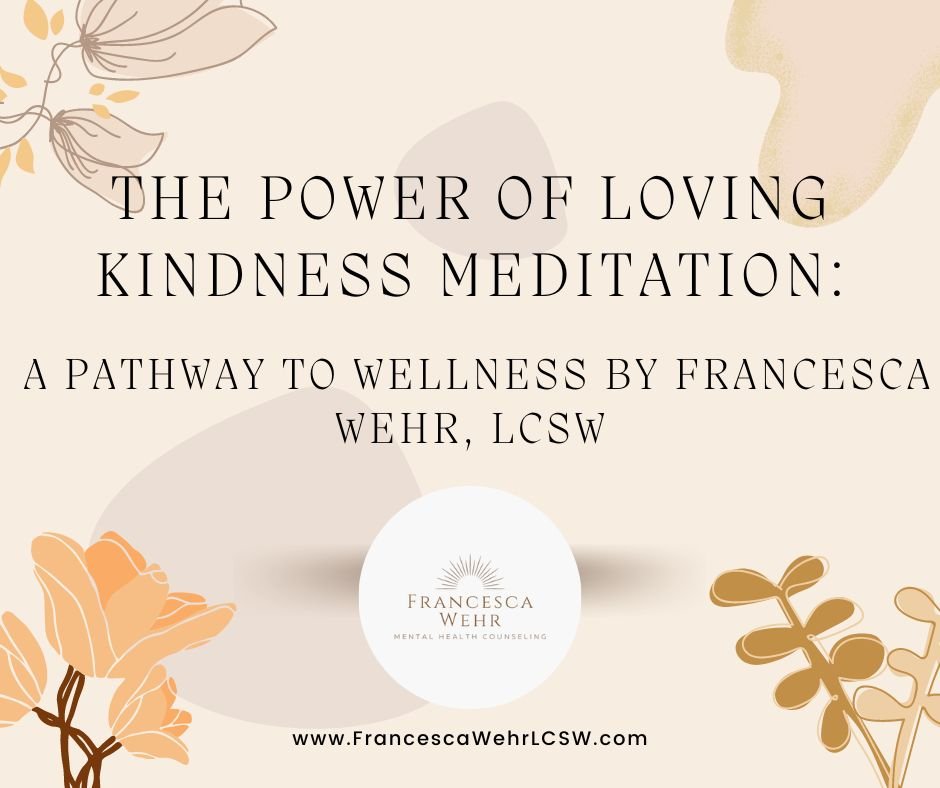
The Power of Loving Kindness Meditation: A Pathway to Wellness with Francesca Wehr, LCSW
The journey to wellness is not a one-size-fits-all approach, but rather a continuous process that involves cultivating self-awareness, mindfulness, and self-compassion. One powerful and evidence-based practice that can foster wellness is Loving Kindness Meditation (LKM). Pathways to Wellness: Insights from Francesca Wehr, LCSW Mental Health Counseling delves into the benefits of LKM and how you can integrate this practice into your daily life to improve your psychological well-being.




